Patho nsg - Study guides, Class notes & Summaries
Looking for the best study guides, study notes and summaries about Patho nsg? On this page you'll find 330 study documents about Patho nsg.
Page 4 out of 330 results
Sort by
Advanced Patho NSG5003 Immunity and Infection
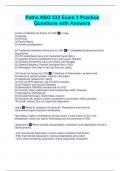
-
Patho NSG 533 Exam 3 Practice Questions with Answers
- Exam (elaborations) • 20 pages • 2024
-
- $11.49
- + learn more
(5) Non-modifiable risk factors for CAD (1) Age (2) Gender (3) Ethnicity (4) Family history (5) Genetic predisposition (6) Traditional modifiable risk factors for CAD (1) Dyslipidemia (abnormal serum lipoproteins) (2) HTN (endothelial injury and myocardial hypertrophy) (3) Cigarette Smoking (endothelial injury and oxygen radicals) (4) Diabetes (endothelial injury and vessel wall damage) (5) Obesity/Sedentary Lifestyle (strongest link to CAD) (6) Atherogenic Diet (high in salt, fat, ...
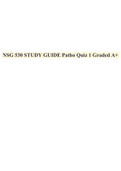
-
NSG 530 STUDY GUIDE Patho Quiz 1 Graded A+.
- Exam (elaborations) • 13 pages • 2023
-
- $10.99
- 3x sold
- + learn more
NSG 530 STUDY GUIDE Patho Quiz 1 Graded A+. STUDY GUIDE FOR QUIZ #1 Advanced Pathophysiology Study the process of meiosis – specifically what occurs when homologous chromosomes fail to separate Human cell can be categorized into gametes (Sperm & egg cells) and somatic cells, which include all cells other than gametes. Each somatic cell nucleus has 46 chromosomes in 23 pairs. These are diploid cells, and the individual’s father and mother each donate on chromosome per pair. New somatic...
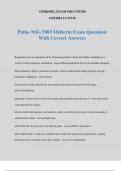
-
Patho NSG 5003 Midterm Exam Questions With Correct Answers
- Exam (elaborations) • 16 pages • 2024
- Available in package deal
-
- $11.49
- + learn more
Patho NSG 5003 Midterm Exam Questions With Correct Answers Respirations that are characterized by alternating periods of deep and shallow breathing are a result of which respiratory mechanism - answerDecreased blood flow to the medulla oblongata what pulmonary defense mechanism propels a mucous blanket that entraps particles moving toward the oropharynx - answercilia which term is used to identify the movement of gas and air into and out of the lungs - answerventilation aspiration is mos...
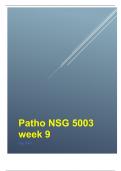
-
Patho NSG 5003 week 9 correctly answered to pass
- Exam (elaborations) • 4 pages • 2024
-
Available in package deal
-
- $9.99
- + learn more
Patho NSG 5003 week 9Cheyne-Stokes respirations are described as a - correct answer Crescendo-decrescendo pattern of breathing, followed by a period of apnea Vomiting is associated with central nervous system (CNS) injuries that compress which of the brain's anatomic locations - correct answer Vestibular nuclei in the lower brainstem Status epilepticus is considered a medical emergency because of the - correct answer Development of cerebral hypoxia What type of seizure starts in the fi...
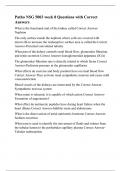
-
Patho NSG 5003 week 8 Questions with Correct Answers
- Exam (elaborations) • 3 pages • 2024
- Available in package deal
-
- $12.49
- + learn more
Patho NSG 5003 week 8 Questions with Correct Answers
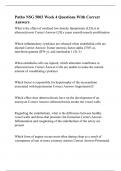
-
Patho NSG 5003 Week 4 Questions With Correct Answers
- Exam (elaborations) • 3 pages • 2024
- Available in package deal
-
- $12.49
- + learn more
Patho NSG 5003 Week 4 Questions With Correct Answers
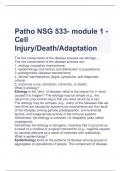
-
Patho NSG 533- module 1 - Cell Injury/Death/Adaptation
- Exam (elaborations) • 12 pages • 2023
- Available in package deal
-
- $13.49
- + learn more
Patho NSG 533- module 1 - Cell Injury/Death/Adaptation The five components of the disease process are etiology.... The five components of the disease process are: 1. etiology (causative mechanisms) 1. epidemiology (risk factors and distribution in populations) 3. pathogenesis (disease mechanisms) 4. clinical manifestations (signs, symptoms, and diagnostic criteria) 5. outcomes (cure, remission, chronicity, or death). What is etiology? Etiology is the "why" of disease--what is the...
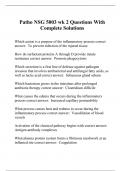
-
Patho NSG 5003 wk 2 Questions With Complete Solutions
- Exam (elaborations) • 20 pages • 2023
-
Available in package deal
-
- $17.99
- + learn more
Which action is a purpose of the inflammatory process correct answer: To prevent infection of the injured tissue How do surfactant proteins A through D provide innate resistance correct answer: Promote phagocytosis Which secretion is a first line of defense against pathogen invasion that involves antibacterial and antifungal fatty acids, as well as lactic acid correct answer: Sebaceous gland sebum Which bacterium grows in the intestines after prolonged antibiotic therapy correct answ...
Patho NSG 5003 Wk 2 Exam With 100% Correct And Verified Answers 2024

Study stress? For sellers on Stuvia, these are actually golden times. KA-CHING! Earn from your study resources too and start uploading now. Discover all about earning on Stuvia




